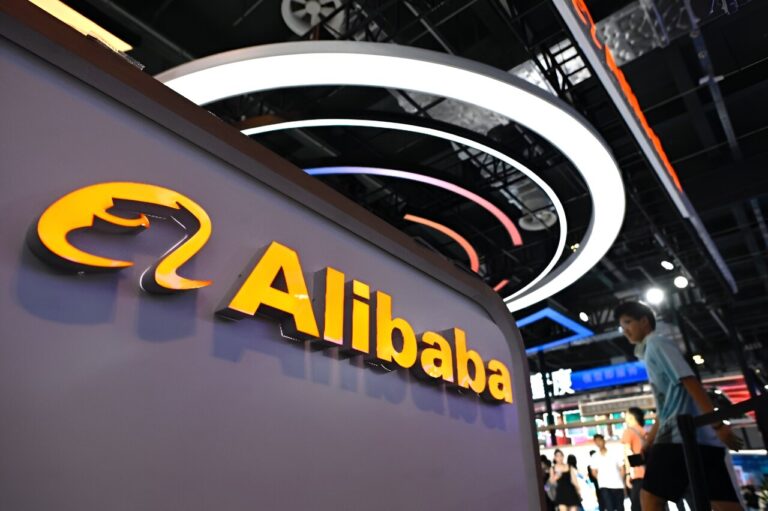× close
Alibaba is one of the largest companies in China’s technology industry.
Chinese e-commerce giant Alibaba said on Tuesday its annual revenue rose slightly as the company undergoes a major overhaul and the country eases restrictions on its tech sector.
The Hangzhou-based company is one of China’s largest high-tech players, with operations spanning retail, digital payments, artificial intelligence, and entertainment.
Alibaba posted revenue of 941.2 billion yuan ($130.4 billion) in the fiscal year ended March 31, an 8% increase from a year earlier, according to a statement.
The statement also revealed that net profit increased 9% year-on-year to 71.3 billion yuan.
Last year, Alibaba announced plans to undergo a major reorganization, splitting into six organizations, each managed by its own CEO and board of directors.
“During the 2024 financial year, we repurchased US$12.5 billion of shares and our board approved a dividend of US$4.0 billion for the 2024 financial year,” said Toby Hsu, the group’s chief financial officer.
China’s tech industry has suffered under a regulatory crackdown by the Chinese government that began in 2020, due in part to government concerns that a small number of companies were amassing too much power and capital. being made to stand.
But the Chinese government has recently signaled that the period of tight regulatory scrutiny is coming to an end, as new headwinds threaten to drag down the world’s second-largest economy.
Analysts say Alibaba’s restructuring decisions are aimed at making the company more agile and insulating parts of its business from a potential future crackdown.
But the company’s planned overhaul is facing obstacles.
In March, Alibaba withdrew its logistics unit Cainiao’s planned initial public offering (IPO) and said it would support the platform “to execute the long-term strategic expansion of its global logistics network.”
And last November, the company called off the spinoff of its cloud computing business. This was a planned move and was part of a plan for an overhaul.
Uncertainty about Alibaba’s future development has persisted since Beijing’s top leaders called off the planned IPO of its financial services arm Ant Group in late 2020.
A month after what was probably the largest delisting in history, it was announced that Alibaba was under formal investigation in China for alleged monopolistic conduct.
slump in spending
Alibaba said on Tuesday it was still working on its long-delayed plan to convert to a dual primary listing in both New York and Hong Kong, nearly two years after announcing the plan.
“The company is preparing for a primary listing in Hong Kong and currently expects to complete this conversion by the end of August 2024,” the company said in a filing on Tuesday.
Tuesday’s annual results release was Alibaba’s first since September, when it announced the sudden departure of former CEO Daniel Zhang.
Later, Mr. Zhang was replaced by Mr. Joseph Tsai as Chairman and Mr. Eddie Wu as CEO. Both positions were previously held by Mr. Zhang.
Financial year 2023 results were lackluster, with annual revenue increasing just 2% year-over-year.
Founded in 1999 in the eastern city of Hangzhou by entrepreneur-turned-celebrity Jack Ma, Alibaba is the country’s digital powerhouse and is considered a barometer of China’s consumer spending.
Fellow internet giant Tencent also announced on Tuesday that sales growth had slowed in the first three months of this year.
Tencent said its revenue rose 6% in the first quarter, the weakest growth the company has recorded in a year, as it continues its AI efforts.
The Shenzhen-based company is one of the most valuable companies in China’s technology industry. The company operates the domestic ubiquitous “super app” WeChat and provides diverse services such as gaming, cloud computing, content streaming, and artificial intelligence.
China’s government has sought in recent months to increase state aid to its struggling economy, as high youth unemployment and a spiraling debt crisis in the real estate sector threaten to drag growth.
Retail sales growth in March, a key indicator of consumer spending, slowed to 3.1% year-on-year, official figures showed last month, down from 5.5% in the first two months of 2024.

